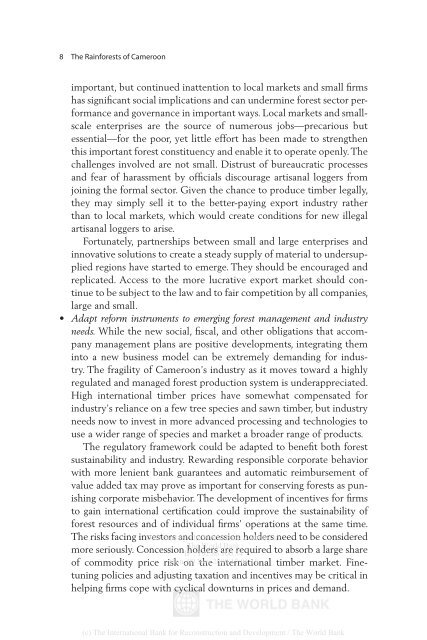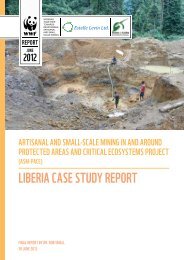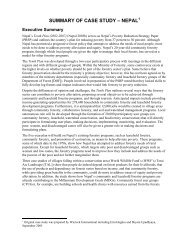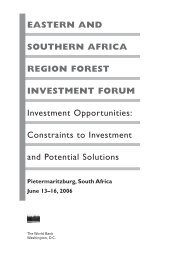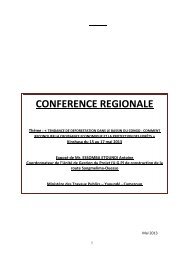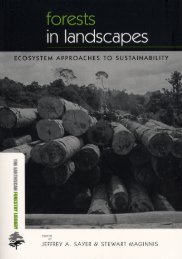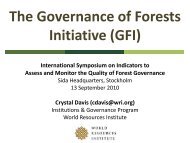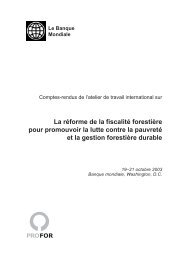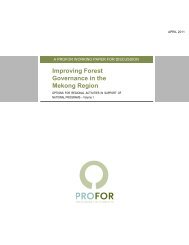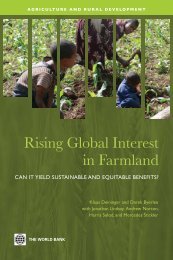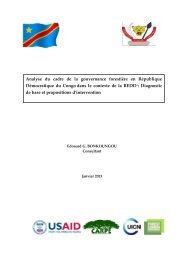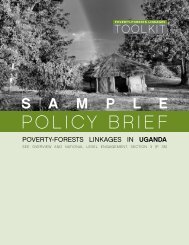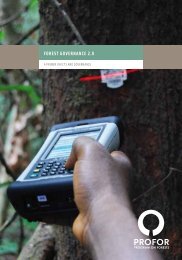The Rainforests of Cameroon - PROFOR
The Rainforests of Cameroon - PROFOR
The Rainforests of Cameroon - PROFOR
- No tags were found...
Create successful ePaper yourself
Turn your PDF publications into a flip-book with our unique Google optimized e-Paper software.
8 <strong>The</strong> <strong>Rainforests</strong> <strong>of</strong> <strong>Cameroon</strong>important, but continued inattention to local markets and small firmshas significant social implications and can undermine forest sector performanceand governance in important ways. Local markets and smallscaleenterprises are the source <strong>of</strong> numerous jobs—precarious butessential—for the poor, yet little effort has been made to strengthenthis important forest constituency and enable it to operate openly. <strong>The</strong>challenges involved are not small. Distrust <strong>of</strong> bureaucratic processesand fear <strong>of</strong> harassment by <strong>of</strong>ficials discourage artisanal loggers fromjoining the formal sector. Given the chance to produce timber legally,they may simply sell it to the better-paying export industry ratherthan to local markets, which would create conditions for new illegalartisanal loggers to arise.Fortunately, partnerships between small and large enterprises andinnovative solutions to create a steady supply <strong>of</strong> material to undersuppliedregions have started to emerge. <strong>The</strong>y should be encouraged andreplicated. Access to the more lucrative export market should continueto be subject to the law and to fair competition by all companies,large and small.• Adapt reform instruments to emerging forest management and industryneeds. While the new social, fiscal, and other obligations that accompanymanagement plans are positive developments, integrating theminto a new business model can be extremely demanding for industry.<strong>The</strong> fragility <strong>of</strong> <strong>Cameroon</strong>’s industry as it moves toward a highlyregulated and managed forest production system is underappreciated.High international timber prices have somewhat compensated forindustry’s reliance on a few tree species and sawn timber, but industryneeds now to invest in more advanced processing and technologies touse a wider range <strong>of</strong> species and market a broader range <strong>of</strong> products.<strong>The</strong> regulatory framework could be adapted to benefit both forestsustainability and industry. Rewarding responsible corporate behaviorwith more lenient bank guarantees and automatic reimbursement <strong>of</strong>value added tax may prove as important for conserving forests as punishingcorporate misbehavior. <strong>The</strong> development <strong>of</strong> incentives for firmsto gain international certification could improve the sustainability <strong>of</strong>forest resources and <strong>of</strong> individual firms’ operations at the same time.<strong>The</strong> risks facing investors Delivered and by <strong>The</strong> concession World Bank holders e-library to: need to be considered<strong>The</strong> World Bankmore seriously. Concession IP holders : 192.86.100.34 are required to absorb a large share<strong>of</strong> commodity price risk Mon, on 09 Nov the 2009 international 17:06:18 timber market. Finetuningpolicies and adjusting taxation and incentives may be critical inhelping firms cope with cyclical downturns in prices and demand.(c) <strong>The</strong> International Bank for Reconstruction and Development / <strong>The</strong> World Bank


